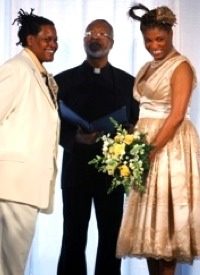
Homosexual couples began marrying March 9 in Washington, DC, nearly a week after a measure permitting same-sex marriage passed its final legal hurdles and became law. Scores of couples picked up the marriage licenses they had been allowed to apply for on March 3, even as opponents continued their efforts to get the measure overturned or placed before the city’s residents in a ballot referendum.
With enactment of the Religious Freedom and Civil Marriage Equality Amendment Act, the District of Columbia becomes the sixth U.S. jurisdiction to legalize same-sex marriage, following Connecticut, Iowa, Massachusetts, New Hampshire, and Vermont.
The measure, which had been introduced nearly six months ago in the DC Council, received almost unanimous support from the 13 council members, and was passed in December 2009 by DC Mayor Adrian Fenty. However, because Washington, DC, is a federal district, the measure faced a mandatory review by the U.S. Congress before becoming official law on March 9.
On March 2, a day before the measure became law, opponents of the measure were still appealing to the U.S. Supreme Court to stop the city from issuing marriage licenses to homosexual couples, arguing that DC voters should be allowed to vote on whether or not they want same-sex marriage legalized in their community.
But the High Court rejected their request, with Chief Justice John Roberts writing for the majority, “It has been the practice of the court to defer to the decisions of the courts of the District of Columbia on matters of exclusively local concern.” Roberts also pointed out that Congress had not taken its prerogative to stop the passage of the law.
Opponents of the measure, like Stand For Marriage DC, have also asked local courts to allow a voter referendum on same-sex marriage, and, wrote Roberts, they “will have the right to challenge any adverse decision … in this court at the appropriate time.”
Bishop Harry Jackson of Stand For Marriage DC warned that before the dust settles on the legal maneuverings, DC will face “the same mess that they had in California where thousands of people were married and then when it got on the ballot, they repealed everything.”
As same-sex couples planned their wedding ceremonies, clergy from some mainline churches in the DC area were ready and waiting to help them tie the knot. “As a pastor, I am called to extend care and grace to all people even as Jesus did,” said Rev. Mary Kay Totty, pastor of D.C.’s Dumbarton United Methodist Church. “We celebrate love and loyalty wherever it is found.”
In February, as the measure was just days from becoming law, Dumbarton’s church council voted to “honor and celebrate the wedding of any couple, licensed in the District of Columbia, who seek to commit their lives to one another in marriage.”
Episcopal clergy in Washington, DC, were also given permission by their diocese to marry homosexual couples. “Through the grace of Holy Baptism, there are no second class members of the Body of Christ,” said Bishop John Bryson Chane of the Diocese of Washington a day after the law went into effect. “We are of equal value in the eyes of God, and any one of us may be called by the Holy Spirit into holy relationships as well as Holy Orders.”
Following the passage of the measure, Catholic Charities of the Washington Archdiocese informed its employees that it would be compelled to drop health care coverage for spouses of employees. “I am writing to you to inform you of an important change to our group health care benefit plan … due to a change in the law of the District of Columbia,” the agency’s president, Edward J. Orzechowski, told his staff in a letter.
Orzechowski explained in a March 2 interview with the diocese newspaper that the new law “has a requirement that if you provide spousal benefits to employees, then you must provide those spousal benefits to same-sex couples…. The challenge for us was how to comply with the new same-sex marriage law requirements, and continue our partnership with the District of Columbia in serving the poor and vulnerable, and remaining true to the teachings of our faith.”
The Catholic Archdiocese of Washington also warned that under the new law, it would most likely not be able to continue its foster care and public adoption program in the city because of the Church’s policy of placing children only with traditional married couples. The diocese noted that “although Catholic Charities has an 80-year legacy of high quality service to the vulnerable in our nation’s capital, the D.C. Government informed Catholic Charities that the agency would be ineligible to serve as a foster care provider due to the impending D.C. same sex marriage law.”



